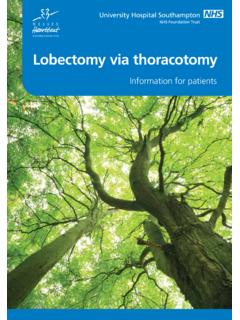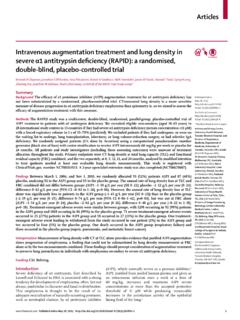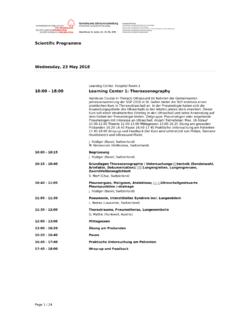Transcription of University College Hospital at Westmoreland Street Lung ...
1 University College Hospital at Westmoreland Street Lung surgery via a thoracotomy Information and advice for patients, relatives and carers 2 If you would like this document in another language or format, or require the services of an interpreter, contact us on 020 3456 7898. We will do our best to meet your needs. Contents 1. Introduction 3 2. What is a thoracotomy? 3 3. What happens during a thoracotomy? 3 4. Why do I need a thoracotomy? 6 5. What will happen if I choose not to have a thoracotomy? 6 6. What alternatives are available? 6 7. How can I prepare for thoracotomy? 6 8. Admission to Hospital 8 9. Asking for consent 9 10. Consent for research 10 11.
2 What should I expect after a long operation via a thoracotomy? 11 12. Physiotherapy for thoracotomy patients 12 13. Leaving Hospital and returning home 13 14. Contact details 16 15. Where can I get more information? 17 16. How to find us 18 3 1. Introduction This leaflet provides information about having a thoracotomy and caring for a loved one who is having a thoracotomy. The care and treatment that you or your loved one will receive will be specific to your needs or their needs. 2. What is a thoracotomy? A thoracotomy is a type of operation that allows the Surgeon to gain access to your affected lung. It is carried out under general anaesthetic. 3. What happens during a thoracotomy?
3 Once you re asleep, we position you comfortably on your side and cover you with sterile drapes. Your Surgeon then makes an incision (cut) across your side, and your rib cage is separated to expose your lungs . The lung to be operated on is deflated, while a breathing tube helps your other lung continue working. The deflated lung can then be examined and operated on. For instance, the Surgeon can take any biopsies needed or remove part (a lobectomy) or your entire lung (a pneumonectomy), if needed. Occasionally, the operation can be done using a keyhole method which means making smaller cuts to the chest. Your Surgeon will discuss with you in advance if he or she thinks this may be possible. In some cases, nearby lymph nodes may be removed as well.
4 If you re relative or loved one is having a lung operation You should be aware that you will have to wait a while before seeing him or her after surgery . The entire procedure, from preparation to the completion of surgery , may take between two and five hours. 4 After surgery , your loved one will be taken to the recovery area. You may be able to visit after a couple of hours. When you visit, be prepared to see your loved one surrounded by tubes and monitors. He or she may be groggy, pale and puffy-looking - this is normal following surgery . The pain medications given may also make him or her sleepy or confused. Types of lung operation Lobectomy - removal of part of a lung 5 Pneumonectomy - removal of the whole lung Segmentectomy/Wedge Resection - removal of a small part of the lung 6 4.
5 Why do I need a thoracotomy? Your Doctor and Surgeon will have discussed with you the reasons why they think a thoracotomy is the most appropriate approach for you. 5. What will happen if I choose not to have a thoracotomy? You can, of course, choose not to have this procedure but please bear in mind that when you were assessed this was thought to be the best treatment option. Whatever your reasons for not wanting to go ahead with a thoracotomy, you should discuss your concerns with your Doctor, Surgeon or Clinical Nurse Specialist (CNS). They will do everything they can to support you. 6. What alternatives are available? Your treatment plan is based on a very well-considered and detailed assessment of your condition.
6 Please feel free to discuss your options with your Doctor, Surgeon or CNS, and ask any questions you have. 7. How can I prepare for thoracotomy? Pre-assessment: You will need to attend a pre-assessment clinic to have the following: Blood tests Chest X-ray ECG (Electrocardiogram a simple and useful test that records the heart s electrical activity) 7 MRSA screening (a simple nose swab to test for Methicillin-Resistant Staphloccocus Aureus a type of bacterial infection that is resistant to a number of widely used antibiotics). Screening helps reduce the chance of patients developing an MRSA infection or passing on an infection to other patients. During the pre-assessment you should tell the Doctor or Nurse if you will need help after the operation.
7 Please make arrangements for a relative or friend to bring you into Hospital and collect you afterwards. Eating well: Continue to eat a balanced diet so that you are in the best condition possible for your surgery . Support at home: Before you come into Hospital , please make arrangements for someone to help you with shopping, cooking and housework while you are recovering. The Physician who referred you to the Surgeon will have discussed with you the reasons for referring you and arranged special investigations, such as CT scans. The things you can do to help yourself before surgery are: Stop smoking: if you smoke you will be advised to stop before the surgery , as this reduces the chance of breathing problems and chest infection.
8 Smoking also impairs wound healing. Take special tests: if you have any other health problems, you will need special tests to make sure you are fit enough to have surgery . You may also need to have some special lung function tests to see how well your lungs are working. Reduce alcohol intake: if you drink more alcohol than the recommended amount you will need to reduce your intake before your surgery . Alcohol can make you dehydrated if you are going to fast for a long period. 8 If you are taking anticoagulants such as warfarin, dabigatran (Pradaxa ), rivaroxaban (Xarelto ) or apixaban (Eliquis )please check with the doctor or surgeon if they need to be stopped and for how long. The exact duration to stop may differ depending on the reason you are taking them and in some instances we may need to give you alternative to take before surgery .
9 You should bring the following items with you to Hospital : Dressing gown, nightdress or pyjamas Slippers Toilet bag and toiletries All medication that you normally take Loose change (for newspapers, etc.) Mobile phone. Please don t bring jewellery, valuables or large amounts of money. You may be admitted the night before your surgery if there is a concern about your other health problems. This is so that the Anaesthetist can assess you beforehand. 8. Admission to Hospital You will receive information from your Surgeon s Secretary with clear instructions for you to follow. There are two pathways for patients coming in for a thoracotomy: Pathway A and Pathway C. The letter from the Secretary will tell you which pathway you will be on.
10 If you are on Pathway A you will be admitted the night before your surgery . If you are on Pathway C you will be admitted on the day of surgery . You will be given information about fasting. 9 The Surgeons, Anaesthetist and Nurse will complete the final pre-operative check-list. If you have not been pre-assessed, you will need to have MRSA screening, blood tests, an ECG, chest X-ray and a shower. If you do not have these, your surgery may be affected or delayed. Thrombo-embolytic stockings: Before going to Theatre you will be given TEDs (thrombo-embolytic stockings), a pair of firm elastic socks to wear to help prevent blood from collecting in the legs and causing clots. You need to wear them until you are discharged home.





